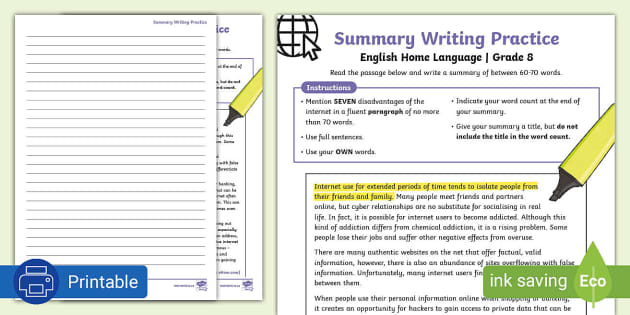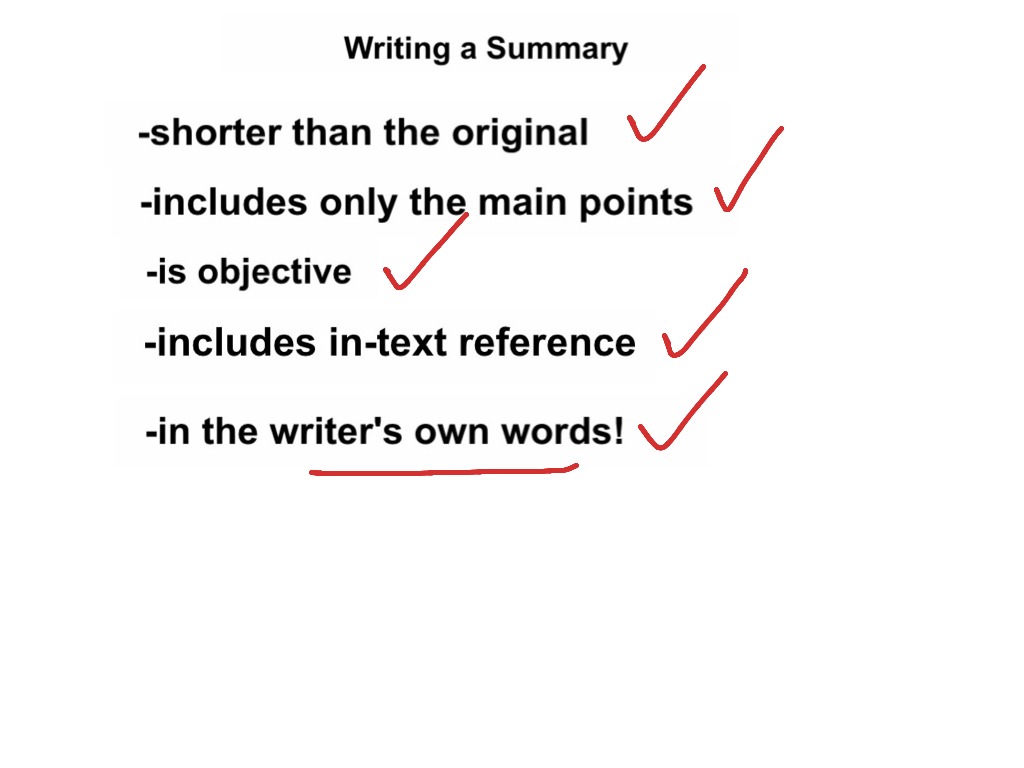How to Improve Your Summary Writing Skills
To improve your summary writing skills, practice condensing information into a few concise sentences. Focus on capturing the main points and key ideas.
Summary writing is a crucial skill, allowing you to convey the essence of a text in a brief and impactful manner. By honing this skill, you can enhance your ability to comprehend and communicate information effectively. This guide will provide valuable tips and techniques to help you improve your summary writing abilities, enabling you to distill complex information into clear and succinct summaries.
Whether you’re a student looking to ace your assignments, a professional seeking to enhance your communication skills, or an individual eager to become a better writer, mastering the art of summary writing will serve you well in various aspects of your personal and professional life. Let’s delve into the strategies that will empower you to refine your summary writing skills and convey your message with precision and clarity.
Understanding The Importance Of Summary Writing
Summary writing is a crucial skill that enhances your ability to convey key information concisely. By avoiding overused phrases and using brief sentences, you can improve your summary writing skills and create engaging content that resonates with your readers. Learn the art of summarizing effectively to optimize your writing and captivate your audience.
Why Summary Writing Is Important
Summary writing is an essential skill that can benefit individuals across various disciplines. Whether you are a student, a professional, or simply someone looking to improve your writing abilities, understanding the importance of summary writing can greatly enhance your overall communication skills. Summarizing involves condensing larger pieces of information into concise and coherent summaries, which effectively convey important points and key ideas. By mastering the art of summary writing, you not only develop the ability to extract essential information from complex texts but also improve your critical thinking, analytical skills, and the overall effectiveness of your written or verbal communication.
Benefits Of Improving Summary Writing Skills
Improving your summary writing skills offers numerous benefits, regardless of your field or occupation. These benefits include:
- Enhanced comprehension: By honing your summary writing skills, you can better understand the core message, main ideas, and key details of any given text. This improved comprehension helps you become a more effective reader and listener.
- Time-saving: Summarizing involves identifying the most crucial information, allowing you to save time by eliminating irrelevant details. This skill is especially valuable when conducting research or studying large volumes of information.
- Improved communication: A well-crafted summary serves as a concise representation of the original text, making it easier for others to understand and absorb the key points without having to read the entire content. Effective communication is crucial in various professional settings.
- Enhanced critical thinking: Summary writing requires you to analyze, evaluate, and synthesize information, promoting critical thinking and a deeper understanding of the material. These skills are highly valuable in problem-solving and decision-making processes.
In conclusion, summary writing is of paramount importance, as it enhances comprehension, saves time, improves communication, and enhances critical thinking skills. By prioritizing and developing your summary writing abilities, you can effectively convey vital information, while also improving your overall written and verbal communication skills.

Credit: www.scribd.com
Practicing Active Reading
Practicing active reading is a crucial skill in improving your summary writing abilities. By engaging with the material, identifying key points, and actively processing information, you can enhance your comprehension and retention, leading to more effective summary writing.
Engaging With The Material
When reading, make a conscious effort to immerse yourself in the text. Take notes, highlight important passages, and ask questions as you go along. This active involvement with the material helps you internalize the content and facilitates easier recollection when summarizing.
Identifying Key Points
Focus on identifying the main ideas and supporting details. Pay attention to headings, subheadings, and any emphasis the author places on certain concepts. Jot down these key points as you read, making it easier to reference them when crafting your summary.
Identifying The Main Idea
When it comes to improving your summary writing skills, understanding how to identify the main idea is essential. By honing this skill, you can effectively distill the central message of a text and recognize the supporting details that reinforce it. Let’s dive into the key aspects of identifying the main idea and how to power up your summary writing capabilities.
Finding The Central Message
Identifying the central message of a piece of writing is crucial for creating a concise and effective summary. To excel in this, start by focusing on the primary theme or the main point that the author is trying to convey. It’s imperative to differentiate between the main idea and minor details, ensuring your summary captures the essence of the text without getting bogged down by extraneous information. By identifying the central message, you lay a strong foundation for crafting a compelling summary.
Recognizing Supporting Details
Once you’ve pinpointed the central message, the next step is to recognize the supporting details that bolster the main idea. These details provide context, evidence, and examples that lend credibility to the central message. Effectively spotting supporting details allows you to emphasize the most pertinent information in your summary while omitting extraneous content. By discerning the supporting details, you can ensure that your summary is comprehensive yet succinct, capturing the essence of the original text.

Credit: www.twinkl.com
Writing Succinct Summaries
When it comes to summary writing, being concise and to the point is crucial. You want to capture the essence of a longer piece of content in a condensed and engaging way. Writing succinct summaries helps your readers quickly grasp the main ideas and key information without getting overwhelmed. In this section, we will explore two important aspects of writing succinct summaries: avoiding repetition and focusing on essential information.
Avoiding Repetition
Repetition is a common pitfall in summary writing that can make your content appear redundant and lackluster. To avoid this, pay attention to the words and phrases you use. Make sure you don’t repeat the same information over and over again.
Here are a few strategies to help you avoid repetition:
- Use synonyms or different words to convey the same idea.
- Combine multiple sentences with similar meanings into a single concise sentence.
- Avoid using unnecessary qualifiers or redundant phrases.
Focusing On Essential Information
When writing a summary, it’s important to prioritize essential information. Your goal is to capture the main ideas and key details while leaving out any unnecessary or tangential information.
To help you focus on essential information, keep the following tips in mind:
- Identify the main thesis or central idea of the original piece and ensure it is prominently featured in your summary.
- Highlight key supporting points or arguments that reinforce the main thesis.
- Avoid including minor details or examples that are not crucial to understanding the main ideas.
Remember, the purpose of a summary is to provide a concise overview of the original content, so prioritize the most important information and omit any extraneous details.
Editing And Proofreading
Editing and proofreading are crucial steps in improving your summary writing skills. These processes help you refine your work, ensuring it is clear and free of grammar and spelling errors. By carefully reviewing and revising your summary, you can enhance its effectiveness and readability. Let’s explore two important aspects of editing and proofreading that will make your summary shine: Checking for Clarity and Eliminating Grammar and Spelling Errors.
Checking For Clarity
Clarity is paramount in summary writing. When checking for clarity, consider the following:
- Ensure your summary conveys the main ideas: Make sure your summary accurately captures the key points of the original text. Avoid including irrelevant or misleading information.
- Use clear and concise language: Write in a straightforward manner, using simple and precise language. Replace wordy expressions with shorter phrases to enhance readability.
- Organize your thoughts logically: Arrange your sentences and paragraphs in a logical order that flows smoothly. Each idea should build upon the previous one, guiding the reader through the summary effortlessly.
Eliminating Grammar And Spelling Errors
To present a polished summary, it’s essential to eliminate grammar and spelling errors. Consider the following tips:
- Proofread your work: After completing your summary, carefully read through it to catch any errors. Pay attention to sentence structure, verb tense, subject-verb agreement, and punctuation.
- Use grammar and spell-checking tools: Take advantage of the various software and online tools available to check for grammar and spelling mistakes. These tools can help you identify errors you may have missed.
- Seek feedback from others: Ask a friend, colleague, or mentor to review your summary and provide feedback. Fresh eyes can often spot mistakes or suggest areas for improvement.
By incorporating these editing and proofreading techniques into your summary writing process, you can enhance the clarity and quality of your work. Remember, the goal is to create a concise and error-free summary that effectively communicates the main points of the original text. Happy writing!

Credit: www.showme.com
Frequently Asked Questions For How To Improve Your Summary Writing Skills
How Can I Improve My Summarising Skills?
To improve your summarizing skills, focus on writing concise sentences with a maximum of 20 words each. Make sure your writing is SEO friendly, unique, and easy to understand. Avoid starting sentences with certain phrases and refrain from using passive voice.
Keep it human-like and pass AI writing detection.
How Can I Make My Summary Better?
To improve your summary, keep sentences short and clear. Use active voice, be unique, and ensure it’s easy to understand. Avoid starting sentences with certain phrases and use engaging, human-like language. This will help your summary be more SEO friendly and effective.
What Skills Are Needed For Summary Writing?
Summary writing requires strong comprehension, analytical, and condensing skills. It also demands the ability to identify key information and accurately convey it in a concise manner. Additionally, proficiency in grammar and language mechanics is essential for effectively summarizing content.
Conclusion
Improving your summary writing skills is essential for effective communication. By following the tips shared such as focusing on clarity, conciseness, and relevance, you will be able to craft compelling summaries that captivate your audience. Remember to practice regularly, seek feedback, and utilize online tools to enhance your writing abilities.
With dedication and consistent effort, you will master this valuable skill and excel in various professional and academic settings. Start refining your summary writing skills today and experience the difference it makes in conveying your ideas effectively.





